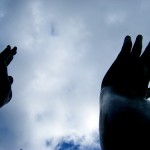Remaining silent – Sh’mini
 When tragedy befell the priestly family, Aaron neither shouted nor screamed, though most people probably would.
When tragedy befell the priestly family, Aaron neither shouted nor screamed, though most people probably would.
Vayidom Aharon, says the Torah text – “Aaron was silent” (Lev. 10:3). At that moment there were no words to make things better. Silence was the only possible response.
One of the great rabbinic leaders of the post-Holocaust generation incorporated this idea into his interpretation of a verse that figures in the b’rit milah ceremony, B’damayich chayi b’damayich chayi – “In your blood, live; in your blood, live” (Ezek. 16:6).
Linking the words vayidom and damayich, he said that after the Sho’ah, one had to speak of being silent.
Yet it was not Jewish silence that he had in mind, but Divine silence.
He raised his hands upward, and his voice shook the rafters of his synagogue as he said to God, “Ribbono Shel Olam, there are times for human beings to be silent in the face of catastrophe, but You, O God, You should never remain silent.
“God, why didn’t You shout out and send a mighty roar across the universe when Your children were dying for You?
“How can You live and still be silent?”
No wonder there was a saying in the pogrom-ridden realms of continental Europe, “If God lived in my village, I would break all His windows!”
The Hebrew poet laureate, Chayyim Nachman Bialik, spoke similarly to God in a poem written at the time of the Kishinev massacres of 1903.
Some people would of course call this way of addressing God sheer effrontery, but there is a long tradition in Judaism of confronting God and reminding Him that as we have responsibilities towards Him, He has responsibilities towards us.
Abraham, Moses, Job, Rabbi Akiva… countless great Jews have come to God in a spirit of challenge… and Job even wanted to put God on trial.



